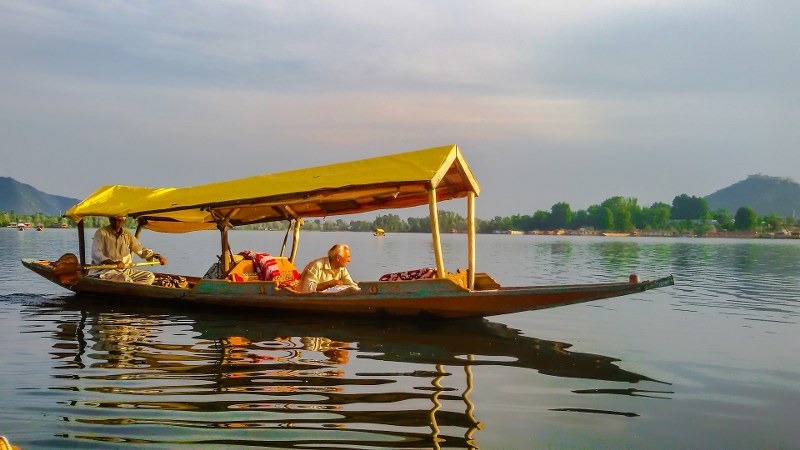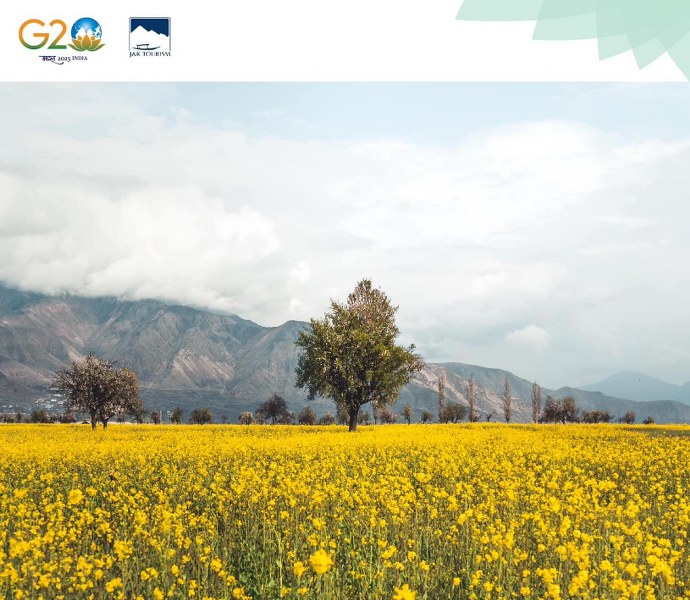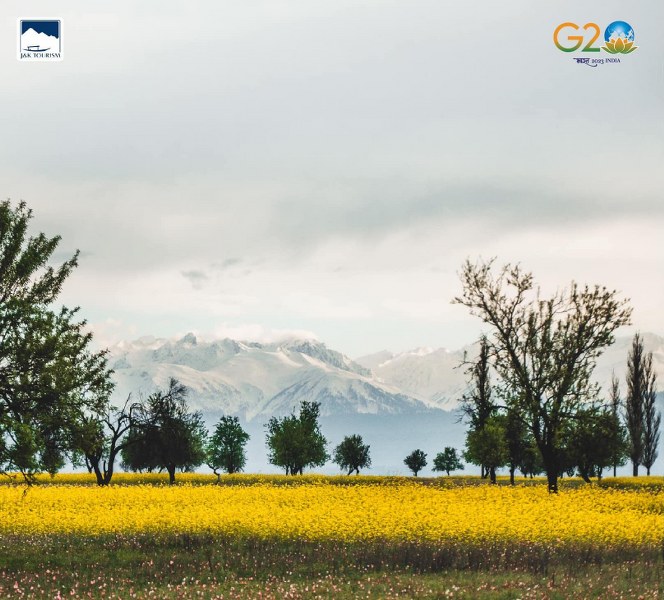 G20 I Kashmir
G20 I Kashmir
Srinagar /IBNS: A fresh coat of yellow paint, newly done seat cushions, and a fresh supply of the latest-design silver trinkets. For Rafiq, the last two weeks have been hectic as he prepares, in excited anticipation, to welcome the masses expected to descend to Jammu & Kashmir’s capital Srinagar for the first international meet in decades.
He is not the only one. The entire city, known for its lakes and gardens, is abuzz with activity and excitement. Shikaras and houseboats are being spruced up. Paper mâché handicraft sellers on the lake are frantically loading up supplies, and eateries stocking up on food.
A G20 embossed air balloon floats over the Srinagar skyline, as the local administration reminds the city of its upcoming tryst with the world when over 50 delegates for the G20 countries arrive for the tourism meet later.
India, which assumed the G20 presidency in December, is proposing to host the third meeting of the working group on tourism here on May 22-24. There will be media, supporting administration, and many others.
While the world gets a glimpse of the new J&K, the newly carved union territory hopes to leverage the opportunity to script a new growth story.

Locals expect the G20 meeting to bring Jammu & Kashmir, celebrated not too far back as the “heaven on earth”, on the bucket list of foreign tourists. The meeting may provide global tourism a new destination, but for locals here it could ring in a significant reset and change their destiny.
At the height of foreign-sponsored militancy in the valley, many countries had issued advisories against travel to J&K. The event allows New Delhi to showcase the changing face of the union territory with a planned over Rs 40,000 crore capital expenditure, announced in the 2023-24 budget.
Kashmir prepare for G20 pic.twitter.com/nFF3Mw1dA0
— India Blooms (@indiablooms) May 6, 2023
A successful G20 tourism meet could help convince these countries to lift these travel advisories, opening the state to international travellers.
That could turn around the fortunes of the locals – boat owners, small businesses, shopkeepers, handloom and handicraft artisans, local growers, hotels, and restaurants – and the economy ravaged by multiple years of terror onslaught from across the border.
The region has already begun to witness a change, and the G20 will allow the world to see that firsthand. The union territory received 470,000 thousand tourists in just the first two months of the year 2023. This is a record of sorts but as per locals may just be a trickle considering the vast potential of the region.

In 2022 over 18.8 million tourists visited J & K, a clear demonstration of the change after the abrogation of Article 370, which has allowed focused attention to the economic issues of the state, increased funds flow for development, and enhanced the union territory’s economic engagement with the rest of the country.
New stories of hope are visible as one travels across the state – of new infrastructure, tourism, and development. The 2022-23 budget announced a “Tourism Mission” initiative built around 75 years of India’s independence. On the board are 75 new destinations, 75 Sufi or religious sites, 75 new cultural/heritage sites and 75 new tracks.
Someday, when tourists arrive at these places, economic gains would follow for the locals who are already benefiting from the development activity around them.
There is a special focus on the promotion of golf in the union territory and new ropeways are being built to facilitate access. Sporting activities will go beyond the picturesque Gulmarg to the other popular tourist destinations Sonamarg, Doodhpathri Yusmarg, Bhaderwah & Patnitop.
The promotion of film tourism will be an important component of the “Tourism Mission” for the year 2023-24 to make the valley the top filming destination, a spot it held before militancy struck.
Caravan Tourism, a new tourism vertical, is being opened up, which will provide tourists with a new activity and aid in promoting unexplored areas and off-beat destinations with minimal infrastructure projects. Eco-mobility facility is being created at Sonamarg so that tourists can visit Thajiwas Glacier as part of sustainable tourism to promote the destination without affecting the environment.
The boat club cum water sports centre at Wular Lake is being upgraded to introduce water sports activities and additional facilities are being created for water-based recreation at Dal Lake.
To promote multiple objectives of tourism promotion, empowerment of local women and making the valley more accessible for female tourists, traditional and cultural festivals will be held and women guides encouraged at tourist places.
The tourism uplift plan also includes the restoration of the old heritage sites at Shergari complex, Old Shri Pratap Singh (SPS) Museum Srinagar, the historical fort at Samba, Narastan Monument at Tral, Pulwama, Hari Parbat Fort at Srinagar and General Zorawar Singh Palace at Reasi.
Infrastructure Lift
While the G20 meeting may have triggered some immediate sprucing up, a massive long-term upgrade of infrastructure is already underway aimed at improving the overall connectivity of the region with the rest of the country.
Air connectivity has improved with an increase in the number of flights and now an uplift of the Srinagar airport is on the cards.
Kashmir valley would be connected with the country's railway network soon through the world’s highest arch bridge on the river Chenab which will be 35 meters taller than the iconic Eiffel Tower. Special Vande Bharat train is being designed to ply this route.
Road construction has nearly doubled from an average of 1500 Km in 2018 to 3200 Km. The 6.5 Km Z-Morh Tunnel on Srinagar- Sonamarg Road expected to be completed in the current year will make one of the key tourist destinations Sonamarg accessible in winter as well.
Elevated Light Metro Rail in Srinagar is expected to be rolled out during 2023-24, helping decongest the local traffic. The proof of the pudding – the union territory is expected to grow by 10 % in the current financial year through this multi-pronged and holistic development focus.
Support Our Journalism
We cannot do without you.. your contribution supports unbiased journalism
IBNS is not driven by any ism- not wokeism, not racism, not skewed secularism, not hyper right-wing or left liberal ideals, nor by any hardline religious beliefs or hyper nationalism. We want to serve you good old objective news, as they are. We do not judge or preach. We let people decide for themselves. We only try to present factual and well-sourced news.







